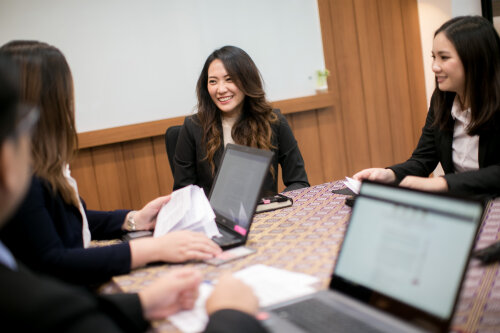Best Child Custody Lawyers in Don Mueang
Share your needs with us, get contacted by law firms.
Free. Takes 2 min.
Free Guide to Hiring a Family Lawyer
List of the best lawyers in Don Mueang, Thailand
Thailand Child Custody Legal Questions answered by Lawyers
Browse our 1 legal question about Child Custody in Thailand and read the lawyer answers, or ask your own questions for free.
- Change stepdaughter last name.
- Hi Me and my wife want to change my stepdaughter last name. My wife and stepdaughter is Thai and my wife has my last name and we want to change my stepdaughter's last name to the same last name as me and my wife. My wife have sole custody of... Read more →
-
Lawyer answer by Mahanakorn Partners Group Co., Ltd
We at Mahanakorn Partners Group (MPG) have over two decades experience in family law.
Read full answer
Thailand Child Custody Legal Articles
Browse our 3 legal articles about Child Custody in Thailand written by expert lawyers.
- What Are the Child Custody Laws in Thailand?
- Child custody laws in Thailand are a key part of Thai family law, especially for people experiencing divorce or separation in the country. These rules strive to safeguard the best interests of the child while balancing the rights and duties of both parents. Whether you are a parent, guardian, or... Read more →
- Child Custody, Support, and Legitimation in Thailand
- When it comes to family law in Thailand, understanding the legal terms surrounding child custody, support, and legitimation can be very confusing, stressful, and time-consuming. Nonetheless, the situation does not necessarily have to be so complicated. This article aims to provide clarity and guidance on the obligations and rights of... Read more →
- How to Find a Divorce Lawyer in Thailand
- Divorce is a difficult and emotionally taxing procedure that may be made even more difficult when it takes place abroad, such as may be the case in Thailand. Anyone may feel overwhelmed by the legal complexities, cultural variances, and other divorce-related issues. But with the right assistance, you may locate... Read more →
About Child Custody Law in Don Mueang, Thailand
Child custody law in Don Mueang, Bangkok, and throughout Thailand, centers on the best interests of the child. When parents separate, whether due to divorce or ending an informal relationship, questions about who will be responsible for a child’s upbringing, care, and decision-making often arise. Thai law recognizes both legal custody (the authority to make major decisions on behalf of a child) and physical custody (where the child lives). The courts prioritize the welfare of the child and may grant joint or sole custody depending on the circumstances.
Why You May Need a Lawyer
Navigating child custody issues in Don Mueang can be emotionally and legally complex. There are several situations where professional legal assistance is especially important:
- If you are divorcing or separating and cannot agree about custody arrangements
- If you are an unmarried parent seeking to establish or defend your parental rights
- When your child’s safety or well-being is at risk, such as in cases of abuse or neglect
- If you are dealing with international custody disputes, such as one parent wanting to move abroad
- If you need to modify an existing custody order due to changes in life circumstances
- When you need to enforce or challenge a custody order
- If language or procedural barriers make it difficult to understand court processes
- When mediation or negotiation with your co-parent requires legal advice
An experienced child custody lawyer can explain your rights, represent your interests in court, and help mediate disputes to reach a solution that also serves your child’s best interests.
Local Laws Overview
Several key aspects of Thai law affect child custody cases in Don Mueang:
- Parental Authority: In Thailand, parental powers are usually shared between married parents. Unmarried mothers automatically have sole custody unless paternity is legally recognized and registered.
- Best Interests of the Child: Thai courts always place the child’s welfare first, considering their emotional, physical, and educational needs when making custody decisions.
- Types of Custody: The law distinguishes between sole and joint custody. Joint custody is common if both parents can cooperate, but sole custody may be granted if one parent is unfit or unable to care for the child.
- Legal Process: Custody matters are handled by the Family Court division of the Central Juvenile and Family Court, which serves Don Mueang. All agreements or court orders regarding custody and visitation must be legally recognized to be enforceable.
- Changing Custody Arrangements: Either parent can petition the court for a change in custody if there is a significant change in circumstances or if the child’s welfare demands it.
- International Issues: Moving a child out of Thailand or bringing them into Thailand for custody purposes often involves complex laws, including the Hague Convention on International Child Abduction if the other country is a party.
- Child Support: Financial support is generally determined separately, but is often connected to custody rights and duties.
Frequently Asked Questions
Who gets custody of the child if the parents are not married?
Under Thai law, the mother automatically has full custody and parental rights unless the father’s rights have been legally established and registered with the authorities.
What does the court consider when making a custody decision?
The court looks at the child’s best interests, considering their health, education, emotional ties, stability, and the parents’ ability to care for the child.
Can custody arrangements be changed after a court order?
Yes. If circumstances have changed significantly or if the arrangement no longer serves the child’s best interests, either parent can apply to the court for a change.
Does Thai law favor the mother over the father?
Married parents have equal rights. For unmarried parents, mothers hold sole rights unless the father goes through legal procedures to establish paternity and gain parental rights. Once established, custody decisions are based on the child’s interests, not the parent’s gender.
Can grandparents or other relatives get custody?
Yes, in situations where both parents are unable or unfit, relatives such as grandparents can apply for custody if it benefits the child.
What steps are involved in filing for custody?
The process typically involves mediation and filing a petition with the Family Court. Both parties will present evidence, and the court will make a decision or approve an agreed arrangement.
How does the court handle international custody disputes?
International cases can be very complex. The court may apply international treaties and cooperate with authorities from other countries if child abduction or relocation is involved.
Is mediation required before going to court?
Mediation is often encouraged and sometimes mandatory before court proceedings, to help families reach an agreement outside of litigation.
Can a child express a preference about which parent to live with?
The court may consider the child’s wishes, especially as they get older, but the final decision is based on their welfare.
What should I bring to my first meeting with a child custody lawyer?
Bring all documents related to your marriage, children’s birth certificates, any existing court orders or agreements, and a summary of any previous custody or support discussions.
Additional Resources
If you need further assistance or information about child custody in Don Mueang, consider contacting the following:
- Central Juvenile and Family Court - The primary court for child custody issues in Bangkok, including Don Mueang
- Department of Children and Youth (DCY), Ministry of Social Development and Human Security - Provides welfare and support for children and families
- Legal Aid Center, Thai Lawyers Council - Offers free or low-cost legal advice to eligible individuals
- Don Mueang District Office - For civil registration issues, birth certificates, and related local housing matters
- Family mediation centers and accredited family law practitioners in Bangkok
Next Steps
If you find yourself facing a child custody issue in Don Mueang, start by gathering all relevant documents and information about your child’s circumstances and your relationship with the other parent. Consider reaching out to a qualified family lawyer to discuss your case and explore your legal options. You may also want to approach the Don Mueang District Office or the Central Juvenile and Family Court for guidance on the formal process.
Make sure to take care of your own well-being and the well-being of your child throughout the process. Getting early legal advice can help clarify your rights and the best way forward. If mediation is available, consider using it to resolve disputes amicably. Remember, the courts will always prioritize the best interests of your child. Stay calm, keep detailed records, and seek professional guidance as soon as possible if you need support or representation.
Lawzana helps you find the best lawyers and law firms in Don Mueang through a curated and pre-screened list of qualified legal professionals. Our platform offers rankings and detailed profiles of attorneys and law firms, allowing you to compare based on practice areas, including Child Custody, experience, and client feedback.
Each profile includes a description of the firm's areas of practice, client reviews, team members and partners, year of establishment, spoken languages, office locations, contact information, social media presence, and any published articles or resources. Most firms on our platform speak English and are experienced in both local and international legal matters.
Get a quote from top-rated law firms in Don Mueang, Thailand — quickly, securely, and without unnecessary hassle.
Disclaimer:
The information provided on this page is for general informational purposes only and does not constitute legal advice. While we strive to ensure the accuracy and relevance of the content, legal information may change over time, and interpretations of the law can vary. You should always consult with a qualified legal professional for advice specific to your situation.
We disclaim all liability for actions taken or not taken based on the content of this page. If you believe any information is incorrect or outdated, please contact us, and we will review and update it where appropriate.









